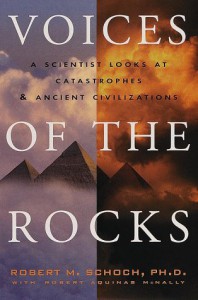Currently reading
Voices of the Rocks

The question on how to view the physical changes of the Earth as well as how and if it effects civilization, dominates the discussion in Dr. Robert M. Schoch’s Voices of the Rocks. Looking through the geological record as well as numerous other sciences, Dr. Schoch puts forwards a different way to look at the history of the Earth and how mankind is affected.
The primary purpose of Dr. Schoch’s book is to propose a different way of viewing how natural laws and processes operate in the universe from the (then) dominate Uniformitarianism and the opposing Catastrophism. The result is a synthesis of the two viewpoints, uniformitarianism with periodic catastrophes which how now become dominate in scientific thinking, however Schoch attaches this synthesis with the Gaia hypothesis that at the time was still be debated but is now being included in larger scientific thought. Although this scientific terminology might seem daunting Schoch writes for the layman who might remember things for high school or college, but isn’t an expert.
Although Schoch’s main emphasis is scientific thought, the subtitle of his book “A Scientist Looks at Catastrophes & Ancient Civilizations” points to the fact that Schoch takes a look at human history as well. Schoch came to fame when he released his geological study on the Great Sphinx that dated it to 7000-5000BCE, much older than the 2500BCE that Egyptologists have dated it. Schoch defends his findings in the case of the Sphinx in terms for a layman but doesn’t go in-depth in detail and terminology as that is not his main purpose in the book. However, Schoch uses his study and the ensuing debate about the progress of civilization and societies to highlight how the rise and collapse of many cultures over time and around the world have been impacted by catastrophic factors both on Earth and from outside of Earth.
While Schoch admits that many of the theories about civilizations and events in Earth’s past are based on his interruption of the evidence proposed either by himself or others who’s work he agrees with, they are an invaluable read whether one agrees with Schoch or not. Yet Schoch also aims at debunking many, some would call them outlandish, theories proposed by von Daniken, Hancock, Stitchin, and many others by the same process of looking at the evidence. Overall while Schoch does incorporate a study of ancient civilizations and societies while looking at his overarching scientific premise, it is more a supporting role.
Overall Schoch’s handles the science very well, his handle on history and societal elements he brings up is unfortunately not so good with many glaring mistakes that even a causal reader will catch. Schoch’s writing style is very fluid and keeps the reader engaged throughout the text, even when his mishandles either history or ancient cultural references. I came to this book with an eye towards the ‘ancient civilization’ in the subtitle in researching for a story I’ve been planning to write for over a decade and while I didn’t get exactly what I was expecting, the scientific information and Schoch relating of his own theories or the theories of other established scientists more than made up for that. Yet I can neither recommend nor warn people way from this book because my purpose for reading is something different from the norm.





 2
2
